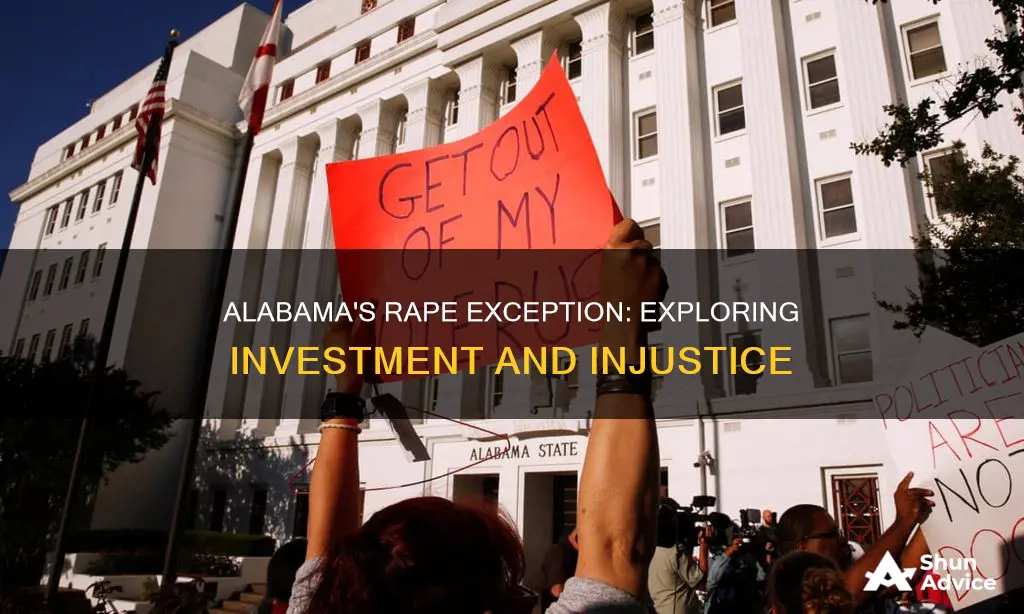
Alabama's abortion ban, which came into effect in June 2022, does not allow exemptions for pregnancies resulting from rape and incest. However, there have been attempts to add exceptions to the law. For instance, Senate Bill 35 (SB 35) seeks to add an exception for rape and incest to Alabama's abortion ban, but it has faced opposition from the ACLU of Alabama. Additionally, Democrats in the Alabama Legislature have introduced legislation to allow exemptions for rape and incest, but they face an uphill battle without significant Republican support. Alabama's abortion law also has implications for statutory rape cases, with the state prosecuting non-consensual sexual intercourse with a minor as rape or sodomy, depending on the age of the victim.
| Characteristics | Values |
|---|---|
| Abortion ban exemptions | No exemptions for pregnancies resulting from rape and incest |
| Abortion ban exceptions | Limited exception in cases that pose "serious health risks" to a pregnant individual |
| Abortion ban start date | June 2022 |
| Abortion ban legislation | The Alabama Human Life Protection Act |
| Abortion ban legislation sponsor | Rep. Terri Collins |
| Abortion ban supporter | Gov. Kay Ivey |
| Abortion ban opposition | ACLU of Alabama, Alabama House Democrats, Sen. Vivian Davis Figures |
| Abortion ban opposition arguments | Cruel and unfair to survivors of sexual assault or incest; people should not need permission to access the care they need |
| Abortion ban support arguments | Unborn children are due equal protection |
| Abortion ban support rate | 12% of Alabamians believe abortion should be illegal in all cases |
| Abortion ban repeal attempts | Bills introduced by Sen. Figures to repeal or add exceptions to the abortion ban |
What You'll Learn

Alabama's abortion ban
Alabama's abortion laws have evolved from strict regulations in the late 19th and early 20th centuries to a period of liberalization following the landmark 1973 Supreme Court decision in Roe v. Wade, which legalized abortion nationwide. However, Alabama has consistently enacted legislation to restrict access to abortion.
In May 2019, Alabama passed one of the nation's most restrictive abortion laws, the Human Life Protection Act. This law banned most abortions at any stage of pregnancy, with no exceptions for cases of rape or incest, only allowing abortions if there was a serious health risk to the mother. The law was granted an injunction until June 2022 when the U.S. Supreme Court overturned Roe v. Wade in Dobbs v. Jackson Women's Health Organization, allowing the Act to take effect.
The Alabama Human Life Protection Act, or the Human Life Protection Act, is the most recent act relating to abortion in Alabama. The bill, which banned abortions at every stage of pregnancy and made it a crime for doctors to perform the procedure except in the case of a medical emergency, was introduced into the Lower House on April 2, 2019. The bill passed the Lower House on April 30, the Senate on May 14, and was signed into law by then-Governor Kay Ivey on May 16, 2019.
The Human Life Protection Act removed exemptions for cases of incest or rape, which were previously allowed. Additionally, cases in which mothers faced mental illness were no longer considered sufficient to provide an exception. These restrictions made the bill one of the most aggressive anti-abortion laws in American history.
Although the bill was approved by Alabama legislators, then-Governor Kay Ivey recognized that its aggressiveness would most likely not be approved in the federal court due to Roe v. Wade. Despite this, Alabama legislators hoped the introduction of the bill could weaken pre-existing abortion protections.
The ACLU of Alabama opposes the abortion ban and supports Senate Bill 34, which seeks to repeal the Alabama Human Life Protection Act. They argue that the abortion ban is an extreme example of government overreach that strips individuals of their right to choose and criminalizes those who perform abortion procedures.
On the other hand, Senate Bill 35 seeks to add an exception for rape and incest to Alabama's abortion ban. The ACLU of Alabama opposes this bill, arguing that abortion ban exceptions are not workable solutions as they require survivors of sexual assault or incest, or someone in a medical emergency, to plead their case to a judge, lawyers, and hospital administrators. They believe that people should not need permission to access the care they need and that no one should be forced to disclose the reasons why they need abortion care.
As of June 24, 2022, with the Supreme Court's overturning of Roe v. Wade, abortion in Alabama became illegal except when the life of the pregnant individual is in danger. There are no exceptions for rape or incest. Attorneys for Attorney General Steve Marshall have stated that the attorney general will prosecute those who help a pregnant person leave the state to obtain an abortion.
Healing Arts: Investing in Indian Wellness Traditions
You may want to see also

Rape and incest exceptions
Alabama's abortion laws are among the most restrictive in the US. The state's abortion ban, the Alabama Human Life Protection Act, came into effect in June 2022 following the Dobbs v. Jackson Women's Health Organization decision, which overturned Roe v. Wade. The law bans all abortions except where the pregnancy poses a serious health risk to the woman. There are currently no exceptions for rape or incest in the state.
However, there have been several attempts to add exceptions for rape and incest to Alabama's abortion restrictions. In 2023, Senator Vivian Davis Figures filed a bill, SB35, to add these exceptions. In January 2024, State Representative Juandalynn Givan pre-filed a similar bill, HB90, which would have created exceptions to the current abortion ban and altered the language surrounding abortions for health risks. In January 2025, House Minority Leader Anthony Daniels filed another bill, HB31, which would amend the 2019 law and add exceptions for pregnancies that are the result of rape and incest.
Despite these efforts, Alabama's abortion ban remains in place without exceptions for rape or incest. This has been criticised by some, who argue that it is cruel and unfair to expect survivors of sexual assault or incest to plead their case to a judge, lawyers, and hospital administrators in order to access abortion care. It is also argued that one-size-fits-all laws do not work and that people should not need permission to access the care they need.
Supporters of the abortion ban, on the other hand, argue that it is a powerful testament to Alabamians' deeply held belief in the sanctity of life. They also believe that the bill presents an opportunity for the Supreme Court to revisit the Roe v. Wade decision and that abortion laws should be decided by individual states.
Stash's Waste Management Investment Offer: Is It Worthwhile?
You may want to see also

Alabama's rape law
First-Degree Rape:
First-degree rape is the most serious charge and can be committed in several ways:
- Forcible Compulsion: This occurs when the perpetrator uses physical force or the threat of force to overcome the victim's resistance or create fear of serious harm.
- Physically Helpless or Mentally Incapacitated Victim: Rape is committed when the victim is incapable of consent due to physical helplessness or mental incapacitation. This includes situations where the victim is unconscious or unable to communicate their unwillingness.
- Victim Under 12 Years of Age: If a person aged 16 or older engages in sexual intercourse with a child under the age of 12, it is considered first-degree rape.
Second-Degree Rape:
Second-degree rape typically involves a victim who is between the ages of 12 and 15 and the perpetrator is at least 16 years old and at least two years older than the victim. This charge also applies when the victim is "mentally defective," meaning they suffer from a mental disease or defect that renders them incapable of consenting to sexual intercourse.
Penalties for Rape:
The penalties for rape in Alabama vary depending on the degree of rape and the ages of the perpetrator and victim. For first-degree rape, the sentence can range from 10 years to 99 years or life in prison, with a minimum sentence of 20 years if the victim is under 12. Second-degree rape carries a sentence of 2 to 20 years in prison.
Statutory Rape Laws:
Alabama's statutory rape laws prohibit consensual sexual activity with a minor under the age of 16. The state recognizes a "Romeo and Juliet" exception for consensual sexual contact between minors who are close in age, such as a 14-year-old and a 15-year-old.
Marital Exemption:
Alabama also has a marital exemption for statutory rape, allowing consensual sexual acts between a married minor and their adult spouse, even if their ages would otherwise prohibit it.
Sexual Abuse Charges:
Separate from rape charges, Alabama also has sexual abuse laws that apply when an offender has "sexual contact" with a minor under the age of 16. This includes touching the victim's intimate parts for sexual gratification, regardless of skin-to-skin contact. Penalties for sexual abuse vary depending on the ages of the offender and the victim.
Registration Requirements:
Individuals convicted of rape or sexual abuse offenses in Alabama are subject to the state's sex offender registration and notification laws. They may be required to register as sex offenders for a specified period or even for life.
H1B Investment: US vs India — Where to Invest?
You may want to see also

Rape first degree
In Alabama, rape in the first degree is classified as a Class A felony. A person may be charged with rape in the first degree if they meet any of the following criteria:
- Engaging in sexual intercourse with another person by forcible compulsion.
- Engaging in sexual intercourse with another person who is incapable of consent due to incapacitation.
- Being 16 years old or older and engaging in sexual intercourse with another person under the age of 12.
Alabama's abortion restrictions, which took effect after the overturning of Roe v. Wade in June 2022, have sparked debates about adding exceptions for rape and incest. While some legislators have proposed bills to include these exceptions, others have sought to increase penalties for abortions and enforce more restrictive laws.
Corporate Investment Management: Strategies for Business Growth
You may want to see also

Rape and sodomy charges and penalties
Alabama defines rape as nonconsensual sexual intercourse and classifies the crime into first- and second-degree rape. The criminal penalties range from two years in prison to life imprisonment without the possibility of parole, along with fines.
First-degree rape or sodomy
First-degree rape or sodomy charges apply when the minor victim is younger than 12. Such offenses constitute class A felonies that carry 10 to 99 years or life in prison and a $60,000 fine. When the defendant is 21 or older and the victim is younger than 7, the defendant must be sentenced to life in prison.
Second-degree rape or sodomy
A person commits second-degree rape or sodomy when the minor is 12, 13, 14, or 15 and the defendant is at least 16 years old and two years older than the victim. A conviction for this class B felony subjects a guilty defendant to two to 20 years in prison and a $30,000 fine.
Sexual Abuse Charges and Penalties
A person can face sexual abuse charges by having "sexual contact" with a minor younger than 16. Sexual contact includes an offender touching a victim's sexual or intimate parts for the purpose of gratifying their sexual desire. Skin-to-skin contact is not required.
Second-degree sexual abuse charges apply when the minor is 13, 14, or 15 and the offender is at least 19. This unlawful conduct is a class A misdemeanour, which carries up to one year in jail and a $6,000 fine. However, if the defendant is at least 15 years older than the minor, the offense constitutes a class C felony, with penalties of one to 10 years in prison and up to a $15,000 fine.
Alabama's Sex Offender Registration and Chemical Castration Laws
Alabama's Sex Offender Registration laws require adult defendants convicted of any of the above statutory rape-related offenses to register as sex offenders for life. Juvenile offenders must register for at least 10 years. Juveniles ordered to register for life can petition the court for removal after 25 years. Failure to register as a sex offender constitutes a class C felony, punishable by up to 10 years in prison and a $15,000 fine.
Building an Effective Investment Portfolio: A Practice Guide
You may want to see also
Frequently asked questions
No, Alabama's abortion ban, which took effect in June 2022, does not allow for exemptions in cases of rape and incest. However, there have been attempts to add exceptions, such as Senate Bill 35, but these have faced strong opposition and are unlikely to succeed due to the Republican majority in the state's legislature.
A recent poll shows that only 12% of Alabamians believe abortion should be illegal in all cases, while 55% believe it should be legal in most or all cases. Additionally, about 8 in 10 Americans support legal access to abortion for pregnancies resulting from rape or incest.
Those against abortion exceptions in Alabama argue that unborn children, regardless of how they were conceived, are due equal protection and that abortion bans with exceptions are not workable solutions. They believe that survivors of sexual assault or incest should not have to plead their case and disclose their reasons for needing an abortion.







